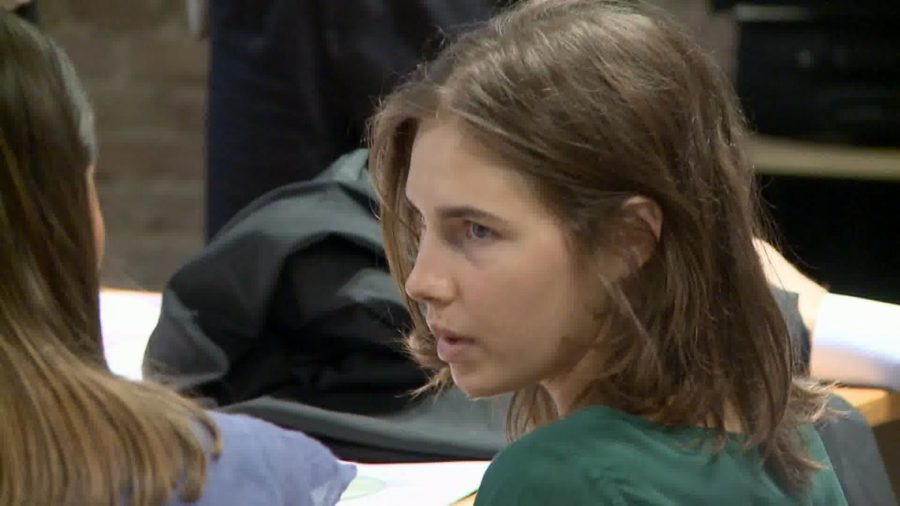Amanda Knox lawyers make final arguments
The judge in the Amanda Knox trial rejects a prosecution request for new DNA testing Wednesday, Sept. 7, 2011 as the American fights her conviction for killing her British housemate, Meredith Kercher.
September 29, 2011
Lawyers for Amanda Knox started their final arguments Thursday in an effort to counter prosecutors’ portrayal of her as a cunning “femme fatale” during her murder appeal in Italy.
Lawyer Carlo Dalla Vedova urged the jury to not let innocent people stay in jail.
Vedova detailed what he called many “mistakes” made in the investigation into the death of Meredith Kercher, Knox’s British housemate who was found with her throat slashed in 2007.
When Knox was arrested and interrogated, she was not allowed a translator and was discouraged from getting a lawyer, Vedova said.
“‘That night Amanda Knox’s right to defend herself was denied,” he said. “She was just a young girl, first time out of the country. She didn’t speak Italian.”
The lawyer was one of three expected to give arguments Thursday.
The judge said Thursday there will be no verdict in the case until after defendant statements on Monday.
Knox looked composed in court as the first of her defense lawyers spoke, but also sad and serious.
Vedova argued that some of the DNA evidence presented by the prosecution should be thrown out.
He said some material was contaminated as a result of poor practice by police, including supposed traces of mixed blood in the bathroom sink shared by the two girls. The prosecution’s use of alleged bloody footprints in their case was also wrong, he said.
As for the knife used to kill Kercher, a key piece of evidence, Vedova told the court there was a “concentration of nothingness, a fantasy” in the prosecution’s arguments.
He ridiculed a theory that Sollecito had not disposed of the knife because he was concerned his landlady would notice it was missing, asking: “What kind of a killer would think about this after committing a murder?”
Showing the court panoramic pictures of the villa Knox shared with Kercher, Vedova rejected the prosecution claim that a fake robbery had been staged by someone inside the house to try to cover up what had happened.
He also suggested the original court had taken sides over some of the evidence, choosing to accept as credible some witnesses whose testimony went against Knox and rejecting others who were in her favor.
Knox’s attorneys’ statements follow arguments presented this week by the lawyer of her co-defendant.
Lawyer Giulia Bongiorno said Tuesday that Knox is not the character the media has painted her to be, and urged a jury to acquit Knox and her client, Rafaelle Sollecito, of murdering Kercher.
Bongiorno compared Knox to the voluptuous cartoon character Jessica Rabbit, who protests, “I’m not bad, I’m just drawn that way,” in the movie “Who Framed Roger Rabbit?”
Bongiorno, who represents Sollecito — Knox’s former boyfriend — said the whole trial was based on DNA evidence “on which mistakes were made,” and urged the jury to “abandon imagined fantasies” and acquit the pair.
Knox and Sollecito are fighting their conviction for killing Kercher — Knox’s roommate — in Perugia, Italy, in 2007. Knox and Sollecito were convicted in 2009. Knox was sentenced to 26 years in prison, while Sollecito got 25.
As she began her closing arguments Tuesday, Bongiorno said there was no physical trace of Knox or Sollecito in the room where Kercher was found murdered.
“The room speaks only of Rudy” Guede, the other man convicted separately of killing Kercher, Bongiorno told the jury.
Knox and Sollecito’s defense teams have suggested Guede, who is already serving a 16-year sentence for the murder, could have been the sole killer.
Evidence that Guede was in the room shows that “no one could enter that room and not leave any trace,” Bongiorno said.
She urged the jury to think about her client as they made their decision.
“The lives of this kid and his parents have been destroyed. You must today evaluate if if these kids committed the crime,” Bongiorno told jurors.
Bongiorno, one of the highest-profile lawyers in Italy, attacked media coverage of the trial as sensational, saying it could have affected what witnesses told the court.
She rejected the notion that the two were into violent sex, saying they rubbed noses in “Eskimo kisses.”
The lawyer also attacked the circumstances under which Knox was interrogated by police the night of the murder, saying she was interrogated by “hostile” officers, which made it impossible to trust what she said that night.
“If one is not calm, anything can happen,” Bongiorno argued.
And she hammered home attacks on DNA evidence that have been a key part of the appeal.
She said police could have contaminated the crime scene or the evidence, playing video from the police investigation to make her point.
Knox and Sollecito are appealing the convictions together, having been convicted in a joint trial.







